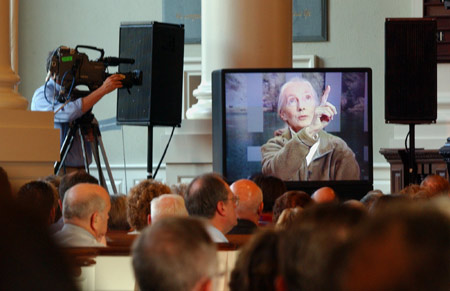Science and spirituality: Good chemistry?

Hundreds of scholars descended on the Memorial Church this week for a three-day conference on the intersection of science and religion that looked for evidence of god in places ranging from chimpanzees to the cosmos.
The conference, called “The Quest for Knowledge, Truth, and Values in Science & Religion: Science and the Spiritual Quest II,” was sponsored by Harvard Divinity School’s Center for World Religions and drew the likes of famed primatologist Jane Goodall and a range of physicists, biologists, and other scientists.
The conference is part of a four-year international effort, collectively called “Science and the Spiritual Quest II,” which brings leading scientists to discuss the connections between their work and their religious beliefs. The Memorial Church conference is the sixth public event in the Science and the Spiritual Quest II series, which has also conducted 16 closed-door workshops. Science and the Spiritual Quest I ran from September 1996 to August 1998.
Science and the Spiritual Quest II aims to break down the traditionally sharp divisions between science and religion and discover where there are points of overlap between religious and scientific teaching, and whether the two disciplines can learn from each other.
The centerpiece of the Memorial Church event was a six-hour telecast and webcast built around three separate panel discussions on the theme “What does it mean to be human?”
In the first of the three discussions, Goodall, who joined the group via satellite from Calgary, Alberta, said that precursors for many human behaviors have been found in her studies of chimpanzees – even behavior such as tool-making, that for years was thought to be a purely human domain. Goodall said she believes that language is the main thing that allowed humans to advance so far from their primate cousins. Language allowed complex communication and the teaching of young about things far away in place and time.
The answer to the question “What does it mean to be human?” was amply illustrated in the events of Sept. 11, Goodall said. In short, it means having the capacity both for far greater evil and far greater good than chimpanzees or any other animal.
“Our brain has enabled us to be both better and worse,” Goodall said. “We have inherited aggressive behavior, but we have also inherited the ability to do good.”
Goodall said she has observed what could be interpreted as a precursor to an animist religion among the chimps when they come upon a spectacular waterfall in the jungle. She said the chimps seem to exhibit a sense of awe, standing in the stream below for 50 minutes at a time and staring at the falling water when they don’t normally like to get wet. They will sometimes sit on a rock and watch the cascade, or swing from a vine into the mist caused by the falling water.
“We find that chimps do have a sense of wonder, of awe,” Goodall said. “I think we can see the roots of some kind of religion from chimp behavior – [inhibited] by their lack of language.”
Joining Goodall on the panel was William Newsome, a neurobiology professor at Stanford University who addressed the issue of where the human spirit begins and where the physiological processes of the brain end. Newsome said that studies have shown many physiological properties of the brain and illustrated the biological underpinnings of personality.
Still, he said, to boil us down to how our neurons function is missing the point. We are greater than the sum of our parts, he said, and science has little to offer when considering what life is all about in making such decisions as whether to relocate across country or how to handle an unruly teenager.
“The most important questions in life are not subject to solution by scientific equation,” Newsome said. “We can, and do, … analyze a potential mate before going ahead and marrying. But in the end if you wait for scientifically valid evidence, you’ll never get married. In marriage, like religion, it’s all about a leap of faith.”




